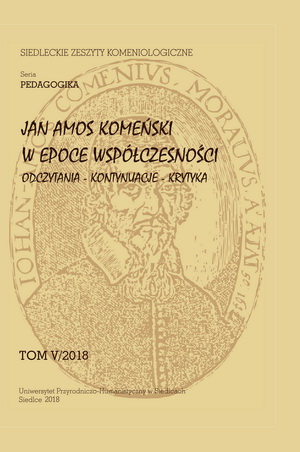John Amos Comenius’ contribution to the development of the didactic methodology
Słowa kluczowe:
pedagogics, didactic methodology, The Great Didactic, educational principlesAbstrakt
The works of John Amos Comenius, as the most prominent thinker in didactics, have often been the focus of researchers in the field. His legacy is a wealth of practical ideas, theories, suggestions, and guidelines, used by today’s pedagogy experts, researchers, and practitioners. This paper will briefly review Comenius’ life and work to determine the influences hisatt itudes and beliefs had on the development of the didactic methodology. Furthermore, our aim is to emphasize the significance of the Comenius’ contribution to the overall development of didactics as a scientific discipline and its methodology. The specific tasks thepap er will perform are as follows: 1. to analyse the life and work of John Amos Comenius; 2. to analyse the works of John Amos Comenius as the most reliable witness to his reformatory ideas; 3. to map his attitudes on pedagogics, pedagogy, and didactic methodology; 4. to indicate the alignment between the didactic methodology and the educational principles. For the purposes of this study, historical analysis and the content analysis of the historical method were used to collect and analyse the data and present the ideas and attitudes expressed in the works of Comenius that form the basis for his educational principles.
Streszczenie
Prace Jana Amosa Komeńskiego, jako najwybitniejszego myśliciela pedagogiki, były często przedmiotem zainteresowania badaczy w tej dziedzinie. Jego spuścizna to bogactwo praktycznych pomysłów, teorii, sugestii i wskazówek branych pod uwagę przez dzisiejszych ekspertów pedagogicznych, badaczy i praktyków. W niniejszym artykule dokonujemy krótkiego przeglądu życia i pracy Komeńskiego, aby określić wpływy jego postaw i przekonań na rozwój metodologii dydaktycznej. Ponadto staramy się podkreślić znaczenie wkładu Komeńskiego w ogólny rozwój dydaktyki jako dyscypliny naukowej i jej metodologii. Artykuł zawiera: 1. analizę życia i pracy Jana Amosa Komeńskiego; 2. analizę dzieła Komeńskiego jako najbardziej wiarygodnego źródła jego reformatorskich idei; 3. przedstawienie jego poglądów na pedagogikę i metodologię dydaktyczną; 4. wskazanie metodologii dydaktycznej w odniesieniu do zasad edukacyjnych Komeńskiego. Wykorzystana została analiza historyczna i analiza zastosowania metody historycznej w celu zebrania i analizy danych empirycznych oraz przedstawienia idei i postaw Komeńskiego zawartych w jego dziełach. Stanowią one podstawę jego zasad edukacyjnych.




